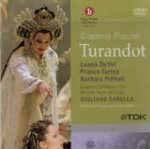This physically beautiful production of Puccini’s Turandot from the Liceu in Barcelona features sumptuous costumes by Franca Squarciapino and equally grand sets by Ezio Frigerio. “Legendary Peking” is a stunning place, with gigantic monuments, stage machinery that allows for Turandot’s brief Act 1 appearance to seem as if she comes from the sky (truly divine), a mirrored floor, a huge gold construction for the question scene atop which sits Emperor Altoum, brilliant red, white, and royal blue costumes for the court, pale blue for the hoi polloi, and Ping, Pang, and Pong dressed in black off-the-shoulder evening gowns and looking for all the world like the late American fashion doyenne Diana Vreeland (perhaps they’re eunuchs?). It’s a feast for the eyes.
The direction of Nuria Espert, at least for 98 percent of the opera, is efficient and makes perfect sense. She works around the grand sets with the chorus moving well, stages the death of the Prince of Persia very effectively, and goes out of her way to make Turandot’s handmaidens seem genuinely devoted to her and her beliefs. The stand-up-and-sing moments–i.e., the arias of Liu and Calaf–are just that, but that’s not a criticism, it’s a fact of opera. The tortures of Timur and Liu is properly disturbing. For the opera’s final scene, the stage goes dark and when visible again, all the sets are gone and Calaf and Turandot are left alone under a starry sky–the effect is marvelous. Espert is well abetted by the stunning, valuable lighting of Vinicio Cheli.
So what is the problematic two percent? In the opera’s last moments, the emperor appears again through the clouds and stars, and Turandot exclaims that the stranger’s name is “love”. Then, rather than submit to him, she stabs herself and drops dead as the chorus wishes the Emperor a long, happy life and Calaf kneels over her. Maybe it isn’t such a bad idea, and it certainly takes you by surprise, but I’d never envisioned this opera as having a bolt from the blue ending.
The singing is a mixed bag. Best is the title role, taken by Luana de Vol. Hers is not a beautiful sound, nor does it have the thrilling edge of, say, Birgit Nilsson. But she’s powerful, accurate, intelligent, and sensitive to the music and text. In Turandot’s introspective moments she sings softly and with a lovely legato almost never heard in this role; indeed, her attention to Puccini’s dynamics is to be greatly admired. Her facial expressions tell us much about this usually one-dimensional character; we actually feel for her after Calaf guesses the answers to the riddles. Given this reading, perhaps Turandot’s suicide is understandable. De Vol’s Turandot is a complete success.
The Liu of Barbara Frittoli is sensitive and sung with a warm vibrato and lovely pianissimos, but she does not make you forget the pathos of Renata Scotto or Mirella Freni. Stefano Palatchi’s Timur is round of tone and properly sad and noble, if a bit too virile. The smaller roles and Ping, Pang, and Pong are all excellently taken. Where this ship sinks is with the ugly, mundane, generic, belt-’em-if-ya-got-’em Calaf of Franco Farina.
Farina’s low notes are non-existent–and they’re needed in the first-act exchanges with Timur and Liu–and his top notes are squealed. He takes the optional high-C after the Riddle Scene, and it’s remarkable that the audience doesn’t race from the theater. This tenor has an international career but has almost never been recorded. The first fact may be true because he never cancels and perhaps he sings for free; the second is self-evident after listening to this. He’s obviously annoying enough to make Turandot commit suicide.
Sound and picture (DD 5.1, DTS 5.1, LPCM Stereo; 16.9 anamorphic) and direction for the small screen are excellent and subtitles are in all European languages and Catalan. A 19-minute-long documentary about Luana de Vol is included as a bonus in which she discusses such things as her career and her teacher, Jess Thomas–and she lets us know that Smetana’s Moldau makes her cry. She comes across as a humble, intelligent woman.
The Met’s garish Franco Zeffirelli production with Marton and Domingo probably is this set’s greatest competition. A recording from Verona with the late Ghena Dimitrova is currently unavailable; and an eccentric Gergiev-led performance is worthy for the very weird production, but the lead singers are not good. I recommend this current one, but try to imagine another tenor. Maybe if we wish hard enough… [3/5/2007]
































